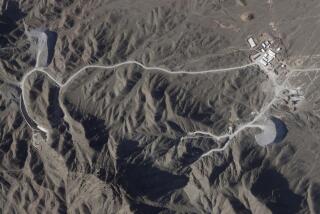With Oct. 25 nuclear plant inspection, Iran backs away from confrontation, official says
CAIRO AND TEHRAN — Saying Iran appeared to be moving away from confrontation with the West, the head of the United Nations nuclear enforcement agency announced Sunday that Tehran had agreed to a date this month for international inspectors to visit what until recently had been a covert underground uranium-enrichment plant.
The decision to open the plant to outside scrutiny on Oct. 25 was a concession by Tehran to defuse Western criticism over the intent and scope of Iran’s nuclear program. In a meeting with world powers last week, Iranian negotiators agreed in principle to grant the International Atomic Energy Agency access to the facility, which President Obama has criticized as a “direct challenge” to global nonproliferation.
“I see that we are shifting gears from confrontation into transparency and cooperation,” said Mohamed ElBaradei, director of the IAEA, who arrived in Tehran on Saturday for talks in what he characterized as a critical moment.
“I hope and trust Iran will be helpful with our inspectors,” he said, “so it is possible for us to be able to assess our verification of the facility as early as possible.”
In Washington, national security advisor James Jones noted during an appearance on CNN’s “State of the Union” program, “The fact that Iran came to the table and seemingly showed some degree of cooperation, I think, is a good thing.
“But this is not going to be an open-ended process,” he warned. “We, the world community, want to be satisfied within a short period of time.”
ElBaradei spoke at a news conference with Ali Akbar Salehi, the head of Iran’s nuclear program. Their appearance together came after a week of public condemnations and closed-door diplomacy over the Fordu uranium-enrichment plant being built beneath the mountains near Qom. The U.N. says Iran violated international law by not notifying the IAEA when construction started more than three years ago.
“It is important for us to send our inspectors to assure ourselves that this facility is for peaceful purposes,” ElBaradei said. “Iran should have informed us the day they have decided to construct the facility.”
Iran has contended that disclosure of the plant was not required until at least six months before nuclear materials were moved into the facility, which is expected to house 3,000 centrifuges for enriching uranium. The discrepancy centers on a change in transparency guidelines that U.N. officials say Iran has ignored.
The U.S., France and Britain have charged that Iran kept the plant a secret in order to deceive inspectors about the goal to build nuclear weapons. Iran says its nuclear program is designed only to generate energy for civilian purposes.
Tehran has repeatedly misled inspectors and brushed aside U.N. orders that it stop enriching uranium. ElBaradei said, however, that there is “no concrete proof” Iran has an ongoing weapons program.
“There are allegations that Iran has conducted weaponization studies,” he said. “These are issues that we are still looking into.”
Negotiations with ElBaradei played into the months-long conflict between the hard-line government of President Mahmoud Ahmadinejad and the opposition movement led by Mir-Hossein Mousavi and other reformers. The opposition, which seeks closer relations with the West, supports the country’s nuclear program but blames the government for mismanagement and needlessly drawing threats of new sanctions from the U.S. and Europe.
The Ahmadinejad camp was faced with the dilemma of opening the plant to inspectors to ease international pressure while not appearing to weaken years of defiance by relenting to Western demands. Satirical attacks from anti-government websites and journalists arose immediately after the agreement with the IAEA was announced.
Salehi, who has accused the U.N. of trying to derail Iran’s nuclear aspirations, wanted to move quickly beyond the inspector issue: “As far as safeguards are concerned, Iran’s nuclear issue has been fully resolved,” he said at the news conference. “We hope that the country’s nuclear case would return to its normal course.”
Ali Larijani, the conservative speaker of the Iranian parliament, was harsher in his rhetoric. Iran’s Press TV quoted him as condemning the West for seeking to “dominate and demand. . . . Their hypercritical claims against Iran’s enrichment work have proved to be nothing but lame excuses. They obviously want to make further demands on the country’s nuclear issue.”
Running parallel to negotiations over the Fordu plant are talks set for Oct. 19 involving the U.S., Russia, France and Iran on a proposal for Tehran to ship uranium to Russia, where it would be enriched up to a level of 20% and then returned. Such a deal would ease Western fears over Iran’s enrichment capabilities while providing Tehran with nuclear materials that can be used for medical and other civilian purposes. An atomic weapon requires at least 90% enrichment.
“We will have a meeting to discuss the technical details and hopefully we will hammer out an agreement as early as possible,” ElBaradei said.
--
More to Read
Sign up for Essential California
The most important California stories and recommendations in your inbox every morning.
You may occasionally receive promotional content from the Los Angeles Times.











